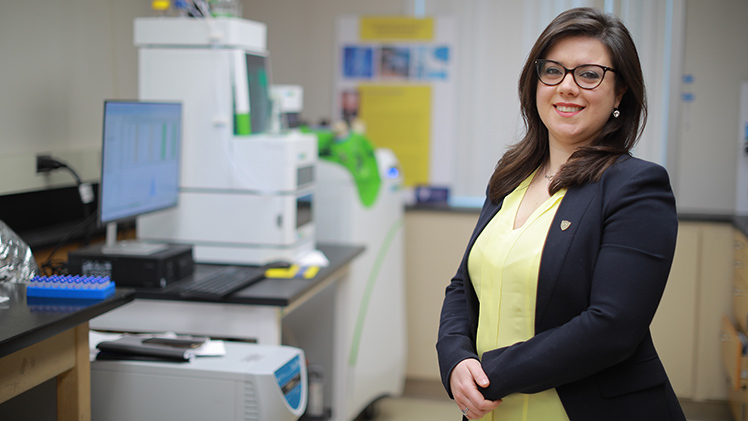A trailblazing faculty member at The University of Toledo, Dr. Emanuela Gionfriddo is now a member of an elite group of researchers across the country.
The assistant professor of analytical chemistry has been pushing the envelope on miniature, environmentally friendly laboratory methods. But it was an innate curiosity to understand the world around her, Gionfriddo said, that inspired her to pursue a career in chemistry.

Dr. Emanuela Gionfriddo received a five-year, $756,354 National Science Foundation award through the Faculty Early Career Development (CAREER) Program.
“Environmental phenomena directly affect humans and their well-being in both very direct and more elusive ways,” she said. “This is why I chose to focus my research on topics that lay at the interface of environmental chemistry, separation science and human exposure.”
As she uncovers the chemical composition of pollutants ranging from fracking wastewater to PFAS and pesticides in an effort to discover their distribution path, the National Science Foundation awarded Gionfriddo a five-year, $756,354 award through the Faculty Early Career Development (CAREER) Program.
The NSF CAREER program supports prestigious early-career faculty who have the potential to serve as academic role models in research and education, and to lead advances in the mission of their university.
“It is an honor to receive the CAREER Award, which will no doubt boost my team’s research momentum and help us engage underrepresented minorities in science,” Gionfriddo said. “I am also grateful for the support and encouragement of my mentors at UToledo and beyond, and my support team spread among different countries.”
Born and raised in Italy, Gionfriddo joined UToledo in 2018.
Gionfriddo’s NSF research project, “Understanding Molecular Mechanisms Underlying Chemical Behavior of Pollutants in Heterogeneous Environmental Systems,” aims to improve what we know about the transport, distribution and fate of organic pollutants in air, water, soil, plants and animals.
“Organic pollutants are continuously released to the environment by industrial and agricultural activities and use of pharmaceuticals,” Gionfriddo said. “These pollutants can alter environmental processes and have far-reaching effects on humans and wildlife.”
The methods used in her laboratory are innovative in many ways.
Gionfriddo’s team wields micro-extraction methodologies to study the distribution of organic pollutants. Of particular interest are emerging classes of organic pollutants, such as pesticides, pharmaceuticals and perfluoroalkyl substances and their degradation products, and how they partition and interact under naturally occurring environmental conditions.
“We use miniaturized devices to probe the chemical composition of the matter,” Gionfriddo said. “This allows us to obtain an accurate chemical snapshot of all the small molecules that are part of the samples we analyze.”
These probes, called solid-phase microextraction devices, allow scientists to establish how environmental pollutants distribute in water, air, aerosols and among natural and human-made polymers like microplastics.
“These findings will allow us to discover paths of distribution of these contaminants in the environment, and this, in turn, will elucidate routes of exposure for humans and wildlife,” Gionfriddo said.
Her laboratory technique minimizes waste produced for chemical analysis, making it an environmentally friendly or “green” chemical analysis method.
As part of the grant-funded research, Gionfriddo plans to engage students from elementary school to high school in her laboratory activities to expose them to scientific research, mentoring and hands-on experimentation.
“The challenges that scientists belonging to underrepresented minorities face have been overlooked for too long,” Gionfriddo said. “Efforts made to raise awareness on the importance of diversity in STEM promote an inclusive professional environment.”
In particular, she wants to use her role as a leader of a research program to motivate girls to follow in her footsteps.
“I strongly feel it is my responsibility to share my unique experiences as a woman in a STEM field, providing young women with valuable resources for their studies and future careers,” Gionfriddo said.